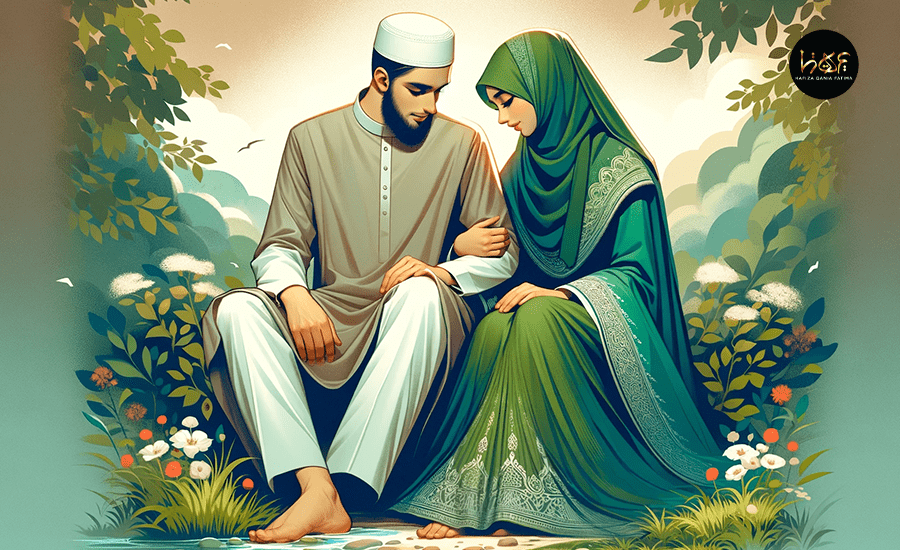
The concept of “rights of a wife in Islam” is deeply significant, offering a nuanced understanding of marital dynamics in Islamic teachings. Islam views marriage as a sacred covenant, going beyond a mere social contract. It’s a bond that nurtures love, compassion, and mutual respect. This article explores the various rights accorded to a wife in Islam, illustrating how these rights uphold her dignity and promote a respectful and harmonious matrimonial life.
Rights of a Wife in Islam
In Islamic teachings, a wife’s rights are paramount, ensuring her respect and dignity within the marriage. These rights, rooted in Islamic law, are also exemplified in the actions and teachings of Prophet Muhammad (صَلَّی اللہُ تَعَالٰی عَلَیْہِ وَاٰلِہٖ وَسَلَّمَ).
1. Right to Mahr (Dower):
The concept of Mahr in Islamic marriage is not just a formality but a profound expression of respect and commitment. It’s an obligatory gift from the husband, whether in the form of cash, property, or other assets, and serves to honor the wife and establish a sense of security and respect. This tradition, deeply rooted in Islamic jurisprudence, empowers the wife financially, allowing her a form of financial independence and security within the marriage. The amount of Mahr is not fixed, allowing flexibility and consideration of the husband’s financial situation, but it must be a meaningful expression of commitment.
2. Right to Respect and Kind Treatment:

Respect and kindness towards wives are not just recommended in Islam; they are imperative. The teachings of Islam, illustrated in various Hadiths, position kind treatment of wives as a measure of a man’s goodness. Prophet Muhammad (صَلَّی اللہُ تَعَالٰی عَلَیْہِ وَاٰلِہٖ وَسَلَّمَ) has emphasized this through his own example, treating his wives with immense kindness and respect. This principle encourages a harmonious marital relationship, fostering a loving and compassionate environment in the family.
3. Right to Financial Support:
In Islam, the husband’s role as a provider is clearly defined. He is responsible for meeting the basic needs of his wife, including food, clothing, and shelter, in accordance with his financial capacity. This obligation relieves the wife of financial burdens and reflects the Islamic principle of care and protection within the family structure. It acknowledges the wife’s right to a stable and secure life, free from economic worries.
4. Right to Education and Personal Growth:
Islam’s advocacy for women’s education and personal development is a testament to its progressive stance. A wife in Islam is entitled to pursue her education and personal interests. This right underscores Islam’s recognition of women’s intellectual capabilities and their right to personal growth and development. It encourages women to contribute not only to their families but also to the broader society, enhancing their roles beyond domestic confines.
5. Right to Marital Privacy:
Privacy in marriage is a critical aspect in Islam. A wife’s right to privacy encompasses the respect for her personal space, thoughts, and belongings. This respect is crucial in building trust and maintaining the sanctity of the marital bond. It involves protecting each other’s confidentiality and ensuring that the intimacy of marital life is preserved.
6. Right to Parental Involvement:
Islam acknowledges that a woman’s marriage does not sever her ties with her birth family. A wife maintains her relationships with her parents, siblings, and extended family. It is the husband’s duty to facilitate and honor these relationships, understanding their importance in his wife’s life. This right highlights the balanced approach of Islam in maintaining family ties and respecting the wife’s ongoing role in her original family.
7. Right to Fair Treatment:
Fairness in treatment, especially in marriages involving more than one wife, is a fundamental Islamic principle. Each wife is entitled to equal treatment, care, and respect. This principle ensures that no wife feels neglected or less valued, maintaining harmony and justice in the family structure. It’s a reflection of the broader Islamic values of justice and equality.
8. Right to Sexual Fulfillment:
Sexual fulfillment in marriage, according to Islam, is not just a physical aspect but also an emotional and spiritual connection between the husband and wife. A wife’s right to a fulfilling and considerate sexual relationship is recognized and respected. This aspect of marriage is seen as integral to the strengthening of the marital bond, fostering intimacy and mutual understanding. Islam encourages partners to approach sexual relations respectfully and sensitively, ensuring they meet each other’s needs and well-being, thus nurturing a deeper, more meaningful connection.
9. Right to Seek Divorce:
Islam takes a balanced approach to marital discord by allowing a wife to seek divorce if she does not receive her rights or faces mistreatment or neglect. This right is a reflection of the Islamic commitment to justice and fairness in relationships. It empowers women to make decisions for their well-being and upholds the sanctity of marriage as a mutual partnership based on respect and kindness. Although discouraged, Islam permits divorce as a last resort to maintain the wife’s rights and dignity.
Conclusion:
The comprehensive understanding of a wife’s rights in Islam reveals a religion deeply committed to justice, respect, and equality in marital relationships. These rights protect the well-being of women and foster a nurturing and harmonious family life. By embracing these principles, Islamic marriages can become beacons of mutual respect, love, and compassion. The expanded discussion on each right emphasizes the depth and breadth of Islamic teachings on marriage, underscoring the religion’s progressive and humane approach to the rights and dignity of women.
FAQs:
Q: What is the significance of Mahr in an Islamic marriage?
A: Mahr, a mandatory gift from the husband to the wife, symbolizes respect and commitment in an Islamic marriage. It’s a tangible expression of the husband’s responsibility towards his wife, and it plays a vital role in ensuring her financial security and autonomy within the marriage.
Q: How does Islam emphasize the kind treatment of wives?
A: Kind treatment of wives is a core tenet in Islam, strongly advocated by Prophet Muhammad (صَلَّی اللہُ تَعَالٰی عَلَیْہِ وَاٰلِہٖ وَسَلَّمَ). Numerous Hadiths consider a man’s kind treatment of his wife as a measure of his character and a vital component of a harmonious marital relationship.
Q: What are the educational rights of a wife in Islam?
A: Islam advocates for the education and personal growth of women. A wife in Islam has the right to seek education and personal development, reflecting the religion’s encouragement for women to be knowledgeable and active members of society.
Q: How does Islam ensure fairness in polygamous marriages?
A: In cases of polygamy, Islam mandates fairness and equitable treatment of all wives. This ensures equal time, financial support, and emotional care for each wife. It prevents any feeling of neglect in the marriage.
Q: What are the provisions for divorce in Islamic law?
A: Islam permits divorce as a last resort to respect and ensure the rights and dignity of both partners. A wife can seek divorce for unmet marital rights or mistreatment. This shows Islam’s commitment to justice and fairness in relationships.
Source:
Dawat e Islami